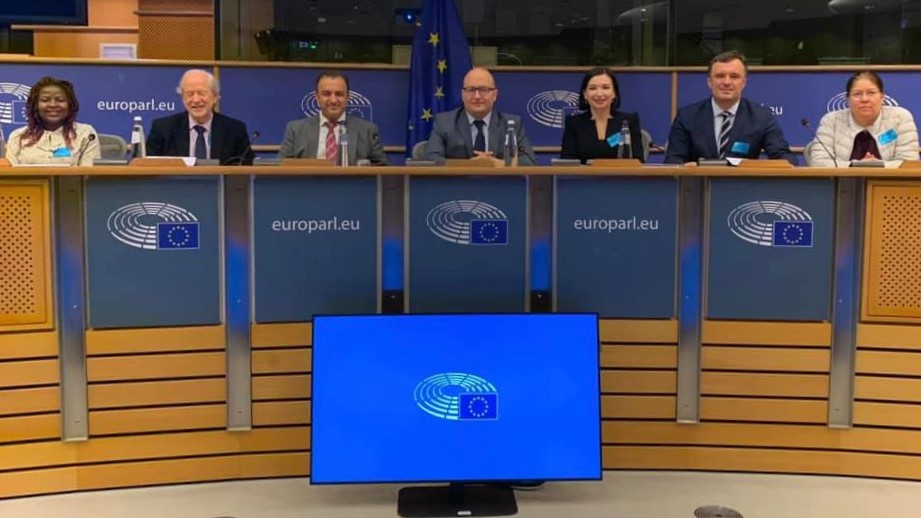On November 6, Panel Discussion on the Role of Citizen Election Observation in Promoting Electoral Integrity was held at the European Parliament. Olha Aivazovska represented Civil Network OPORA and took the floor.
Leaders of nonpartisan public election observation organizations from 15 countries around the world shared their observation experience. Participants also spoke about the role of public observation in promoting electoral integrity and the ability of EU institutions and public observers to work more effectively to address future challenges.
The event was organized by the European Parliament, the Global Network of Domestic Election Monitors (GNDEM), and the National Democratic Institute (NDI).

Here is the full text of Olga Aivazovska's speech:
Dear participants!
I believe that nonpartisan election observation is a valuable investment into electoral integrity, adherence to international standards of free and fair elections, and protection of political rights of citizens in a broad perspective. Voting rights are covered by the Universal Declaration of Human Rights. Thus, deliberate manipulation of public opinion and propaganda, which is quite often used by the Russian Federation to reach its geopolitical goals, as well as for disinformation, fake news, and political corruption – all of it can be treated as violation of human rights. Such impact in a form of cyber-interference, or influence on public opinion goes against the principle of free elections and impedes the free formation of political will. We will still need to learn how to deal with such influences. While it's relatively easy to protect computer hardware, 'soft power' in a form of fake news and manipulations, used to undermine the trust in elections, election participants and administrators, is the biggest issue. Hatred and distrust are emotions that influence the choices citizens make. And they are easily stirred by social media. It is the 6th year that Ukraine has been at war with Russia, but today only 11% of its citizens can actually distinguish fake news from the real ones, while over 70% believe they can. These are the findings of recent surveys.
Unfortunately, it is not uncommon for our Western partners to shift focus from the fact that monitoring of election process is not enough to protect electoral rights. An election cycle does not finish on the Election Day, and does not begin with the official start of campaign. Therefore, a comprehensive approach is a vital investment in democratic elections of the next election cycle. We can hardly predict weather conditions on the day following the Election Day. However, it is easier to suggest that all the flaws in organization and administration of elections will be repeated on an even larger scale, if not corrected.
Civil Network OPORA has been proactive in election observation for many years already. In particular, we advocate for changes in electoral law. We analyze court decisions related to electoral crimes. We assess the performance of law-enforcement bodies. We protect interests of citizens in courts. We often face a problem that the public does not pay attention to whether countries implement recommendations they receive from local and international observation missions. Systematic cooperation with the Parliament and the highest election administration body helps learn the lessons and correct mistakes through laws and practices.
Observers often collect information about violations, but rarely do they study investigation results and court practices. However, it needs to be done, in order to understand whether the certainty of punishment works. And if it doesn't - why? As a result of resonant monitoring of the police and courts, implemented by OPORA since 2015, the number of guilty verdicts in grave crimes like voter bribery or falsification of electoral documents has significantly increased. Moreover, we witnessed the very first official conviction for such a widespread violation as voter bribery.
Sometimes, when a regulation lacks clarity for identification of violations or fails to provide investigation bodies with procedural instruments, the problem can be easily solved through an amendment. It is much more difficult, though, to correct practices in law enforcement, which should have their impact on the principle of equal opportunities for candidates. In 2019, with the assistance of our Western partners, we managed to conduct a series of national trainings for police officers and prepare response algorithms for each category of violations. Thus, 120,000 police officers received and used these algorithms. These factors do change the practice.
Besides observers, OPORA deployed a network of electoral rights public ombudsmen to protect voting rights of citizens. This network was complementary to our large-scale observation campaigns, and has proven effective. They focused on electoral rights of internally displaced persons and prisoners, as well as accessibility of voting premises for the disabled people, etc.
However, it is impossible to build a democracy without raising awareness of voters, urging them to be active and take the responsibility, to appeal to law-enforcement and courts, and vote consciously. Voters should be more involved and know their rights. That is why, together with the StarLightMedia media holding, we launched an awareness-raising campaign on leading Ukrainian TV channels. As a result, 42 million Ukrainian citizens saw our materials and episodes. I hope that every country has a socially responsible media business, ready to cooperate with observers and non-governmental organizations for free.
The most valuable asset of a non-governmental organization is its reputation and confidence in the results of its work. Investment in the reputation and capacity of non-governmental organizations, helps to set ambitious objectives and achieve goals.
Thank you.